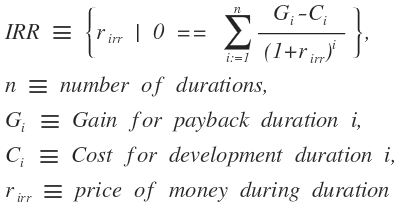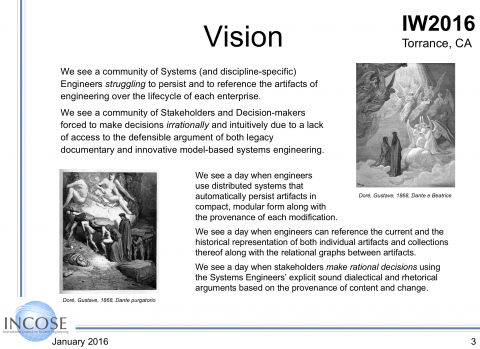Table of Contents
Model Lifecycle Management
Participating
- How to Join the Email Notification Thread: Join the Model Lifecycle Management Google Group.
- How to Edit Content on this Wiki: Request an OMG DokuWiki Login from Roger Burkhart.
- How to Join the GoToMeeting Bi-Weekly Sessions: Join the Email Notification Thread.
- How to Participate as a Practicing Systems Engineer: Join the Email Thread, Get Wiki Access, and Contribute Content in Person and on the Wiki.
Purpose
Our purpose is to identify the scope of model management and then to address the concerns of the community. To do this we may prioritize the items, and then to establish scenarios and best practices that address the concerns of the community.
The purpose of model management is to determine efficient structures to use. Structures include the repository, the models, and within the models. The considerations are many, and each one is discussed in the sections below.
Definition of Concept
Our current de facto definition of the concept of “model lifecycle management”, taken from the INCOSE IS 2014 Whitepaper, is:
Model Lifecycle Management (MLM) is a governance process synchronizing the create, read, update, and delete (CRUD) operations on heterogeneous models within the supporting modeling tools and model repositories, throughout the system development lifecycle. This is accomplished through the management of Model Configuration Items, including versions, variations, configurations and baselines of models, simulations, analysis results, and the tools that are used by multiple geographically dispersed users. In addition, MLM includes the management of all the metadata associated with the models, tools, and analysis results including who made the change, what changes were made, when and why, as well as information regarding the application of the model. A Model Lifecycle Management System (MLMS) is a set of elements that implement a model lifecycle management process, and may include people, hardware, software, data, and procedures.
Measures of Success
This team shall be deemed successful when:
- The Systems Engineering community has recognized it as a source of expertise on Model Lifecycle Management
- The team has published advice in peer-reviewed publications
- The team has prepared and delivered a Concept of Operations for a hypothetical, ideal, yet effective system for Model Lifecycle Management
- The industry no longer suffers from the lack of adequate collaborative modeling and decision-making systems
What's the IRR?
The measure of success perhaps of most interest to managers and modelers alike is: the implied internal rate of return, the rate at which the economic gains from the use of the model begins to exceed the economic costs of the development and maintenance of that model:
During the creation of a model, a certain amount of time is spent with overhead items like check-in, check-out, copying files, and deciphering complexity and relevance. The more time spent with these actions compared to the overall saved time, the less time is spent actually using a model and – most importantly – the less time spent actually achieving business goals and contributing to the business value.
Generally, when the IRR for a tactic is lower than the forecast price of money over the durations of consideration, then an enterprise may be better of not using the tactic because they'd earn a better return simply by banking the costs of development.
Upcoming events
Team Membership
The Model Management Activity Team uses a private Google Group. That Group exposes the list of members to members.
Amit Fisher is the administrator of the Google Groups site. You can contact Amit at amfisher'at'us.ibm.com.
Roger Burkhart is the administrator of the OMG DokuWiki site.
Lonnie VanZandt is the chair of the MLM Activity Team.
Recommended Reading
- [2003] Tools Interoperability ConOps here
PLM4MBSE Working Group
OMG SE DSIG Papers
White Papers
The Model Management community authors white papers to define the scope, terminology, requirement, use cases, current practices and future direction for Model Management systems. These papers are co-edited by the Model Management community and can viewed here:
IS 2014 Publications
Pre-2014 Collaboration Site
Presentations
- INCOSE IW 2016 MLM AT Charter Statement PPT
Activity Pages
- Topical Guide to the IW2017 events of the TIMLM Working Group Here
- Event Report for IS 2016 Here
- Panel Preparation for IS 2016 Here
- MLM-S Stakeholders Analysis Here
- MLM-S Capability Analysis Here
- MLM-S Qualitative Analysis Here
- Team Members' Publications Here
- Suggestions to Standards Committees for the Evolution of Notations Here
- Difficult Questions Here
History
30 January 2016 INCOSE IW (Day 1)
- Agenda: here
Notes
- Some 16-18 people attended this meeting to review the agenda for the workshop and to review the charter of Activity Team.
- A good portion of the discussion related to the overlapping scopes of INCOSE's various working groups. One gentleman (someone please remind me) asked if the MLM AT would be surveying the industry on their tool use. A survey such as that is very useful. Attending the Tools Interoperability Working Group, I heard John Nallon present his team's survey of the industry for various Systems Engineering tools. The TIWG also has a Interoperability and Integration Issues paper that provides a catalog of tools, notations, and practices.
31 January 2016 INCOSE IW (Day 2)
Notes
- Session included a review of the panel presentation artifacts including the CFP requirements, the Whereas statement, the list of candidate panelists, the CVs of the panelists, and the position statements of the candidates.
- Attendees included:
- Adrian Whitfield, IBM
- Nerijus Jankevicius, No Magic
- Aurelijus Morkevicius, No Magic
- Saulius Pavalkis, No Magic
- Dirk Zwemer, Intercax
- Len Wozniak, General Motors
- Derek Piette, PTC
- Stephanie Chiesi, Raytheon
- Mark Sampson, Siemens
- Tomas Huldt, TMC Consulting
- John Nallon, CSC
- Jonathan Rigaud, Airbus
- Bob Kenley, Purdue
- Willie Wilson, Aerojet Rocketdyne
- Lonnie VanZandt, Sodius
01 February 2016 INCOSE IW (Day 3)
Notes
- Morning Session was a discussion about work occurring in peer teams including the NAFEM-INCOSE and the Agile SE teams. John Nallon of the Tools Interoperability Working Group spoke about the Survey research, the Requirements and ConOps preparation, and the work with STEP and PDES.
- Lonnie advised the attendees that the session was transitioning from presentations to work sessions. Lonnie described the wiki tactics for recording elicited capabilities, stakeholders, and operations.
- After lunch, a diligent few worked on some of the ConOps artifacts. Lonnie also represented the team's charter to newcomers Donna Nystrom and Hans Peter de Koning.
- Attendees:
- Len Wozniak, General Motors
- Derek Piette, PTC
- John Nallon, CSC
- Willie Wilson, Aerojet Rocketdyne
- Bryan Pflug, Flug
- Brett Nadler, University of San Diego
- John Palmer, Boeing
- Lonnie VanZandt, Sodius
- Donna Nystrom, Aerospace Corporation
- Don Tolle, CIMData
- Hans Peter de Koning, EESA
02 February 2016 INCOSE IW (Day 4)
04 December 2015, Team Call
- Agenda |here
Model Management Telecon - 2015 September 04
INCOSE IW 2014 Jan 25.
Model Management Workshop - 2013 January 26 and 27
The event agenda has been annotated with notes and reference to slides presented. Please walk thus Model Management – Joe Bedocs, Brian Brady link for more details.
Model Management Telecon - 2012 May 21
This file is updated from our discussion of it on the telecom. Please be sure to read the notes; not everything is on the slides. If you have comments, please send me a word document. Each comment should reference a slide number.
This is only something to throw darts at and start a more meaningful discussion. If you can send me comments by June 8th, I can get this updated for our telecom on June 18th.
Model Management Telecon - 2012 Feb 20
During this meeting we had a discussion about sharing low level properties in a model with other models. In a specific example, Axel was interested sharing low level CAD properties like 0,0,0 reference point and axis orientation with other system models. But this need extends to all domain-specific models. We need exposure of all properties held by a model. We would like to get at the data without going through an API, without knowing the meta model, and preferably without know the repository details.
The group agreed to capture their ideas in some written form (model, drawing, sentences) and send to me by the end of the first week of March.
I will look for a place where these can be posted, and also look into setting up a model environment to capture these scenarios.
Model Management Telecon - 2011 Oct 11
During this meeting we had a discussion about what the group wants to do. Ron spoke about metrics other than time such as accuracy, completeness, correctness, useful. That we might look at using measures of complexity, traceability and other possibilities for measures of success. The group is very interested in creating a list issues that are in the scope of model management. The group agreed to dig deeper into these areas in preparation for the IW Workshop.

